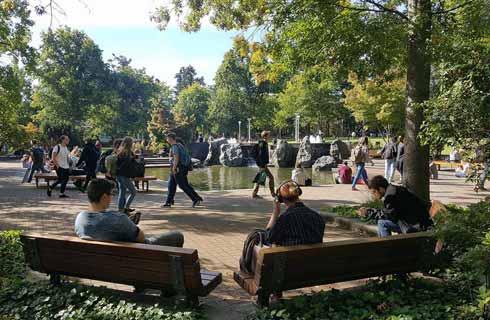- IDP China>
- 课程库>
- 艺术与设计>
- 艺术、人文与社会科学>
- 行为科学>
- Bachelor of Science (Honours) in Psychology with Cognitive Neuroscience - Including Foundation Year
认知神经科学心理学学士学位(荣誉学位)-包括预科课程
Bachelor of Science (Honours) in Psychology with Cognitive Neuroscience - Including Foundation Year

学历文凭
Bachelor Degree with Honours

专业院系
Department of Psychology

开学时间

课程时长

课程学费

国际学生入学条件
IDP—雅思考试联合主办方

雅思考试总分
5.5
- 雅思总分:5.5
- 托福网考总分:72
- 托福笔试总分:160
- 其他语言考试:PTE - 42 overall, with a minimum of 42 in each component
CRICOS代码: C813
申请截止日期: 请与IDP联系 以获取详细信息。
课程简介
Our BSc Psychology with Cognitive Neuroscience (including foundation Year) will be suitable for you if your academic qualifications do not yet meet our entrance requirements for the three-year version of this course and you want a programme that increases your subject knowledge as well as improves your academic skills to support your academic performance.<br><br>This four-year course includes a foundation year (Year Zero), followed by a further three years of study. During your Year Zero, you study three academic subjects relevant to your chosen course as well as a compulsory academic skills module, with additional English language for non-English speakers.<br><br>After successful completion of Year Zero in our Essex Pathways Department, you progress to complete your course with our Department of Psychology.<br><br>Psychologists conduct experiments to study cognitive abilities such as how we perceive others, how we make decisions, how we remember or how we speak. Cognitive Neuroscientists link these questions directly to underlying brain processes: they make use of brain imaging techniques to answer which brain areas support these abilities. They also use time-sensitive imaging methodologies to explore the exact timing of these processes. Together, researchers from both disciplines aim to map the relationship between brain and behaviour.<br><br>You’ll be introduced to contemporary research questions from different fields including vision, hearing, memory, and language. You’ll develop a thorough understanding of how these questions can be answered, what the current state-of-the-art knowledge is, which methodologies are best suited to study which questions, and how different subfields work together to further our understanding of what may seem like simple questions but are in reality complex endeavours. You’ll be immersed in a supportive, interactive, and methodical hands-on environment.<br><br>If you want to understand the brain processes that allow us to answer how we think about the world, how we interact with the world and how we experience the world, then psychology with cognitive neuroscience at Essex is for you. We provide one of the most immersive and exciting experiences of studying the human mind in the UK. We focus on the big questions so that you embark on a journey into the thoughts, feelings, and actions of individuals.
相关申请
 预科
预科 奖学金
奖学金 实习机会
实习机会 在校学习
在校学习 跨境学习
跨境学习 校园授课-线上开始
校园授课-线上开始 在线/远程学习
在线/远程学习
开学时间&学费
学费信息仅供参考,请与IDP联系以获取详细信息
| 开学时间 | 时长 | 学费 | 地点 |
|---|---|---|---|
| 暂无 | 暂无 | 暂无 | 暂无 |
学校排名

世界排名251
数据源:
泰晤士高等教育世界大学排名
关于埃塞克斯大学

埃塞克斯大学是一所广受尊敬的大学,其校区位于英格兰东部,交通便利,可轻松前往伦敦,为学生提供全面的本科和研究生学位课程以及丰富的大学体验。埃塞克斯大学在科尔切斯特和拉夫顿两个校区开设课程,学生可以在这里获得优质的学术资源和高标准的教学。埃塞克斯大学的教师帮助学生迎接生活中的挑战,鼓励学生个性发展、同伴互助学习、批判性思维和独立生活。埃塞克斯大学热烈欢迎国际学生,从开学第一周起就组织了丰富多彩的活动。埃塞克斯大学营造了一个多元化、包容性强的社区,学生可以在这里结交终生好友,创造难忘的经历。埃塞克斯大学还为国际学生提供各种奖学金,以及就业技能方面的支持和研讨会,帮助他们在学习期间和学习结束后成功申请工作。学生通过参加讲座、研讨会和小组学习来推进课程。他们还可以使用艺术与人文学部、科学与健康学部以及社会科学学部的众多设施。热门学科领域包括计算机科学、商业与管理、经济学、法律和健康。埃塞克斯大学与世界各地的大学建立了跨学科的合作伙伴关系,丰富了其研究和学习。学生可以享受两个校区提供的设施--例如行业标准的工作室、编辑室、健身房、校内电影院、公共学习区、学生会社交空间等等
本校相关课程

社会学和管理文学硕士
学历文凭
Masters Degree (Taught)
开学日期
课程费用总额


工商管理硕士:埃塞克斯工商管理硕士
学历文凭
Masters Degree (Taught)
开学日期
课程费用总额


智能系统和机器人科学理学硕士
学历文凭
Masters Degree (Taught)
开学日期
课程费用总额


研究生文凭统计与运筹学
学历文凭
Graduate Diploma
开学日期
课程费用总额


研究生数学和金融文凭
学历文凭
Masters Degree (Taught)
开学日期
课程费用总额


金融与投资理学硕士
学历文凭
Masters Degree (Taught)
开学日期
课程费用总额

其他相关课程

MPsych高级心理学
 普利茅斯大学
普利茅斯大学泰晤士高等教育世界大学排名:590
学历文凭
Undergraduate Masters
开学日期
课程费用总额


心理学硕士(临床)
 南昆士兰大学
南昆士兰大学学历文凭
Masters Degree (Research)
开学日期
课程费用总额


心理科学学士
 迪肯大学
迪肯大学泰晤士高等教育世界大学排名:206
学历文凭
Bachelor Degree
开学日期
课程费用总额


MSc Business and Organisational Psychology (with Professional Experience)
 考文垂大学
考文垂大学泰晤士高等教育世界大学排名:637
学历文凭
Masters Degree (Taught)
开学日期
课程费用总额


Postgraduate Diploma in Arts - Applied Behavioural Analysis
 奥克兰大学
奥克兰大学学历文凭
Postgraduate Diploma
开学日期
课程费用总额


保护和灵长类动物行为-理学硕士
 肯特大学
肯特大学泰晤士高等教育世界大学排名:482
学历文凭
Masters Degree (Taught)
开学日期
课程费用总额










